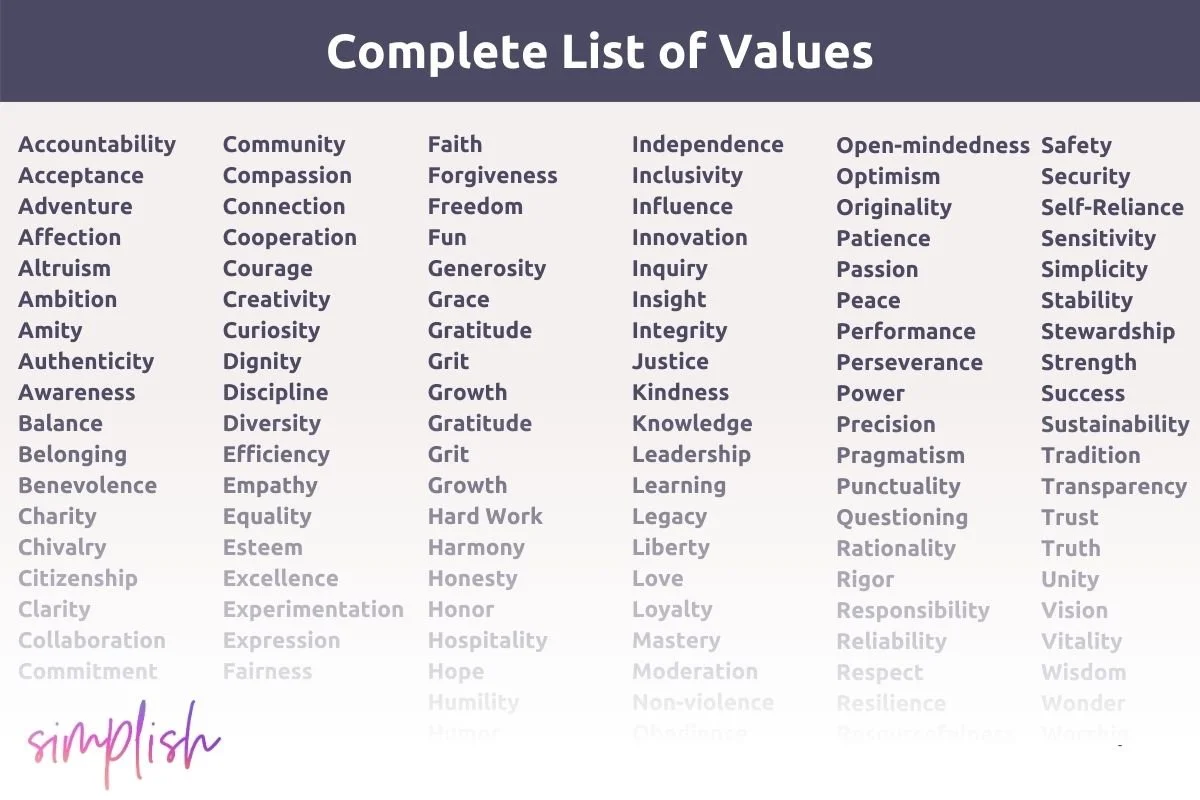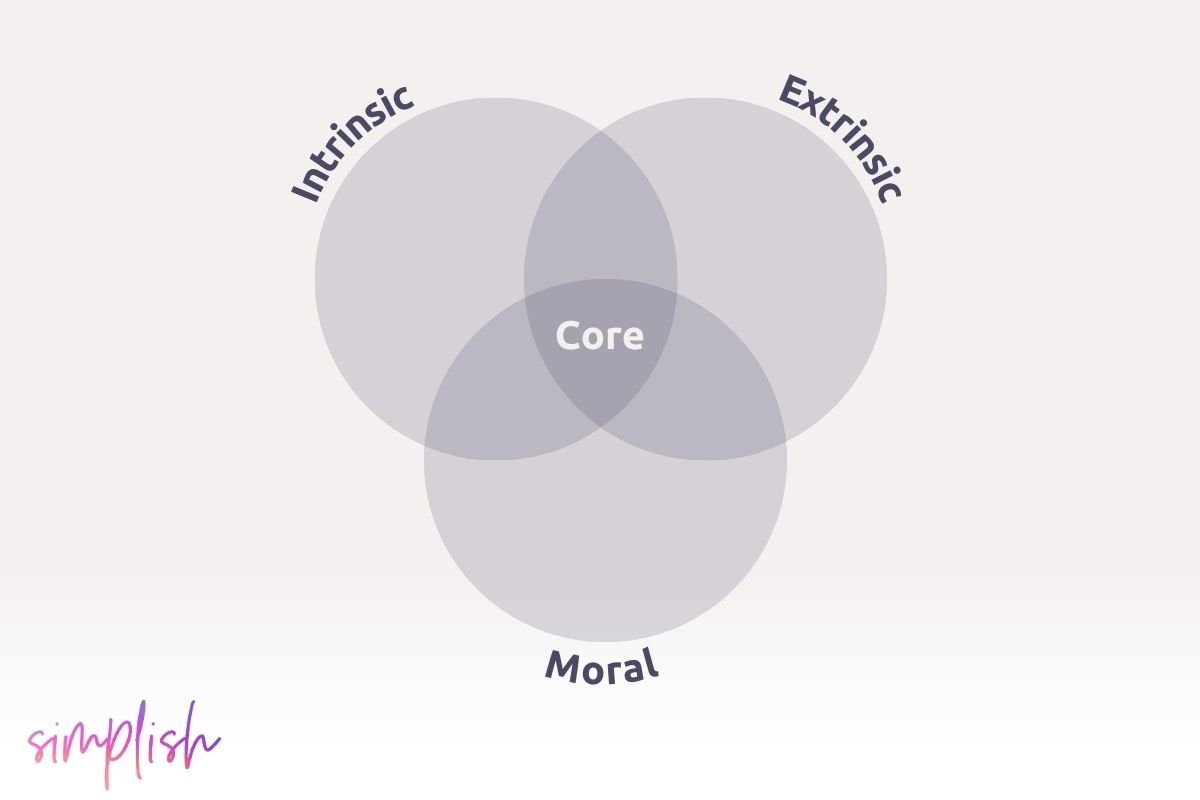Different Types of Values (+Examples)
"Values" are a buzzword these days.
Don't worry if you've been nodding along... but are actually a little lost 😅 As it turns out, even the scientists who study this are a bit confused!
So, what are values?
Essentially, values are the principles tying together everything that's most important to you. Accountability, empathy, creativity, justice, and wisdom are a few examples of values from our complete list of values.
Going a little deeper, you could define values as the guiding principles defining your perception of success and meaning in life.
But did you know that there are actually different types of values?
Sociologists and psychologists categorize values a bit differently, but both disciplines offer insight into where your values come from and how they shape your decision-making processes, behavior, and choices. By exploring the different types of values in this article, you can gain insight into how your own values work together as a system influencing your motivations, sense of self, and decision-making process.
Fascinating, right? Let's get into it.
Why It's Important to Know Your Values
Understanding your values is crucial because they influence the choices you make. Values are deeply embedded in human behavior. They shape your beliefs about what is right and wrong, important and unimportant, worthy of effort or better left undone. Deeply knowing your own values builds self-respect, guides clear decision-making, and supports a sense of purpose in life.
In other words: values shape your priorities, whether or not you're aware of this process. When you're aware of how your values are shaping your priorities, you give yourself a choice to make changes to how you prioritize goals that move you toward the life you want to live.
Out in the world, values play a significant role in organizational culture, reflecting the core principles that a community or organization stands by. Organizational values come from various sources, including financial incentives, the personal experiences of organizational leaders, and culture. Knowing your own personal values can help you to identify the organizations that support what's most important to you, while navigating away from those that neglect or even oppress what you value.
While it may sound abstract, this wisdom is highly practical when it comes to making decisions in life.
Not so sure about that job offer? Checking to see if your values align can help you decide whether to take a role - and if you do, how to minimize role conflict by finding communities outside of work that share your values.
The Most Common Values, According to Research
What matters most to you may be highly personal, but there are some common themes.
When looking at different types of values in this article, we rely on a comprehensive list of values based on concepts rather than structures. For example, instead of listing "family" as a value, we include the supporting concepts of loyalty, tradition, and love.
In scientific research on values, it's important to note that there is little consensus on how to actually define values. For example, some studies include family as a value, while others do not.
That being said, one comprehensive study has found that some values are indeed universal. The most common themes include engagement with family and traditions, personal growth and responsibility, and economic priorities.
Global analysis of Valuegraphics surveys from 2020 conducted in 152 languages found that the top ten most common personal core values across cultures include: ¹
1. Family
2. Relationships
3. Financial Security
4. Belonging
5. Community
6. Personal Growth
7. Loyalty
8. Religion / Spirituality
9. Employment Security
What Are the Different Types of Values?
The study of values has led to a couple of different theories about the types of values from different disciplines. In sociology, the study of human society, relationships, and culture, values are typically grouped according to how they influence relationships. In psychology, however, the field of study focused on human behavior and the mind, values are typically studied in relation to motivation. Research from both disciplines is helpful when understanding the different types of values in your daily life and how they impact your life.
Different Types of Values According to Sociology
Within the field of sociology, all types of values are typically divided first into two basic categories: instrumental and terminal values, a distinction made famous by the social psychologist Milton Rokeach in 1973.²
Instrumental Values: These are the values that guide your day-to-day behavior and actions. They are means to achieving your end goals. Examples include honesty, respectfulness, responsibility, cooperation, loyalty, and courage.
Terminal Values: These are the end goals that you strive to achieve in life. They represent the ultimate aims that give your life meaning. Examples include happiness, knowledge, inner harmony, love, financial security, and freedom.
This method of categorization gives insight into how values from a wide range of sources influence social interactions and behavior.
Beyond this basic grouping, sociologists sometimes categorize values further into the areas of life where they originate and apply. These include:
Moral Values: These values dictate what is considered right and wrong within a community and are deeply rooted in ethical standards. Examples include honesty, compassion, fairness, generosity, kindness, and respect. Reflecting on your own moral values can be a useful exercise in self-reflection.
Aesthetic Values: These values relate to the appreciation of beauty and artistic expression. They guide our preferences for art, music, and nature. Examples include beauty, elegance, symmetry, harmony, simplicity, and originality.
Political Values: These values shape our political beliefs and actions, reflecting our views on governance, justice, and public policy. Examples include democracy, freedom of speech, equality, justice, and patriotism.
Personal Values: These individual values are personal principles that guide our behavior and decisions in daily life. Examples include integrity, authenticity, independence, gratitude, curiosity, and resilience.
Family Values: These values emphasize the importance of family relationships and responsibilities, often passed down through generations. Examples include loyalty, togetherness, mutual respect, politeness, traditions, and supportiveness.
Cultural Values: These values are shared by members of a cultural group and influence traditions, customs, and social norms. Examples include respect for elders, tradition, collectivism, religious faith, humility, and patriotism.
Social Values: These values influence how we interact with others and contribute to society, promoting social harmony and cooperation. Examples include equality, justice, respect for diversity, community service, democracy, and human rights.
Organizational Values: These corporate values guide the behavior and decisions within an organization. They reflect the company’s mission and vision and serve as a blueprint for employee behavior. Examples include teamwork, integrity, work ethic, serving the community, customer service, and innovation.
Different Types of Values According to Psychology
In psychology, values are often categorized based on their motivational intent, with origins in self-determination theory.³ According to self-determination theory, people develop an effortless, intrinsic motivation in environments that satisfy the human needs for connection (the theory calls this "relatedness"), autonomy, and competence. Extrinsic motivation, in contrast, is driven by an external reward or punishment contingent upon the completion of the activity.
Psychologists classify values according to whether they are driven by intrinsic motivation, extrinsic reward, or a sense of moral righteousness.
Grouping values by motivational intent can help you to understand what motivates you and empower you to set more intentional goals aligned with these motivations.
Intrinsic Values
Extrinsic Values
Sacred & Moral Values
Values are more than just lofty ideals. You live them everyday! Looking at the different types of values can transform how you plan and accomplish your goals by guiding you to explore the motivations behind your tasks.
-
Neufeld, Dorothy. “The World’s Most Influential Values, In One Graphic.” Visual Capitalist. November 5, 2020. https://www.visualcapitalist.com/most-influential-values/.
Debats, D. L. H. M. Meaning in Life: Psychometric, Clinical and Phenomenological Aspects. 1996. Thesis, University of Groningen. [s.n.].
The Center for Self-Determination Theory. “Theoretical Overview,” n.d. https://selfdeterminationtheory.org/theory/.



